
5 Expository Essay Examples (Full Text with Citations)

Chris Drew (PhD)
Dr. Chris Drew is the founder of the Helpful Professor. He holds a PhD in education and has published over 20 articles in scholarly journals. He is the former editor of the Journal of Learning Development in Higher Education. [Image Descriptor: Photo of Chris]
Learn about our Editorial Process
- Video Overview
- Quick Example
- Formatting Guide
An expository essay attempts to explain a topic in-depth, demonstrating expert knowledge and understanding.
This form of essay is structured around the clear, factual presentation of information, devoid of the writer’s personal opinions or arguments.
The primary goal is to inform or explain rather than persuade.
Unlike an argumentative essay, which is built around defending a particular point of view with evidence and persuasion, an expository essay maintains a neutral stance, focusing on delivering straightforward facts and explanations.
An example of expository writing could be an article explaining the process of photosynthesis.
The article would systematically describe each stage of how plants convert sunlight into energy, detailing the role of sunlight, water, and carbon dioxide.
It would explain the sequence of reactions – first, second, third, fourth, fifth – that occur and the importance of each step in supporting the life of the plant.
An expository essay generally follows this essay format:

- A) To persuade the reader to adopt a particular viewpoint
- B) To inform or explain a topic clearly
- C) To present the writer’s personal opinions and arguments
- D) To entertain the reader with creative writing
- A) An expository essay uses creative storytelling techniques
- B) An expository essay remains neutral and avoids personal opinions
- C) An expository essay focuses on persuading the reader with evidence
- D) An expository essay prioritizes the writer’s personal experiences
Expository Essay Examples
#1 impacts of technology on education.
955 words | 4 Pages | 15 References

Thesis Statement: “The integration of technology in education represents a complex and critical area of study crucial for understanding and shaping the future of educational practices.”
#2 Impacts of Globalization on Education
1450 words | 5 Pages | 9 References

Thesis Statement: “This essay examines the profound and multifaceted effects of globalization on education, exploring how technological advancements and policy reforms have transformed access to, delivery of, and perceptions of education.”
#3 The Role of Emotional Intelligence in Interpersonal Relationships
1211 Words | 5 Pages | 22 References

Thesis Statement: “The central thesis is that EI, defined as the ability to perceive, understand, and manage emotions, is a crucial determinant of success and well-being.”
#4 The Future of Renewable Energy Sources and Their Impact
870 words | 4 Pages | 20 References

Thesis Statement: “The essay posits that although renewable energy sources hold immense promise for a sustainable future, their full integration into the global energy grid presents significant challenges that must be addressed through technological innovation, economic investment, and policy initiatives.”
#5 The Psychology Behind Consumer Behavior
1053 words | 4 Pages | 17 References

Thesis Statement: “The thesis of this essay is that consumer behavior is not merely a product of rational decision-making; it is deeply rooted in psychological processes, both conscious and subconscious, that drive consumers’ choices and actions.”
How to Write an Expository Essay

Unlike argumentative or persuasive essays, expository essays do not aim to convince the reader of a particular point of view.
Instead, they focus on providing a balanced and thorough explanation of a subject.
Key characteristics of an expository essay include:
- Clarity and Conciseness
- Structured Organization (Introduction, Body, Conclusion)
- Objective Tone
- Evidence-Based (Cite academic sources in every body paragraph)
- Objective thesis statement (see below)
- Informative purpose (Not argumentative)
You can follow my expository essay templates with AI prompts to help guide you through the expository essay writing process:

How to write a Thesis Statement for an Expository Essay
An expository thesis statement doesn’t make an argument or try to persuade. It uses ‘is’ rather than ‘ought’ statements.
Take these comparisons below. Note how the expository thesis statements don’t prosecute an argument or attempt to persuade, while the argumentative thesis statements clearly take a side on an issue:
💡 AI Prompt for Generating Sample Expository Thesis Statements An expository essay’s thesis statement should be objective rather than argumentative. Write me five broad expository thesis statement ideas on the topic “[TOPIC]”.
Go Deeper: 101 Thesis Statement Examples
Differences Between Expository and Argumentative Essays
Expository and argumentative essays are both common writing styles in academic and professional contexts, but they serve different purposes and follow different structures.
Here are the key differences between them:
- Expository Essay : The primary purpose is to explain, describe, or inform about a topic. It focuses on clarifying a subject or process, providing understanding and insight.
- Argumentative Essay : The goal is to persuade the reader to accept a particular point of view or to take a specific action. It’s about presenting a stance and supporting it with evidence and logic.
- Expository Essay : It maintains a neutral and objective tone. The writer presents information factually and impartially, without expressing personal opinions or biases.
- Argumentative Essay : It often adopts a more assertive, persuasive, and subjective tone. The writer takes a clear position and argues in favor of it, using persuasive language.
- Expository Essay : The reader is expected to gain knowledge, understand a process, or become informed about a topic. There’s no expectation for the reader to agree or disagree.
- Argumentative Essay : The reader is encouraged to consider the writer’s viewpoint, evaluate arguments, and possibly be persuaded to adopt a new perspective or take action.
Go Deeper: Expository vs Argumentative Essays
Ready to Write your Essay?

Take action! Choose one of the following options to start writing your expository essay now:
Read Next: Process Essay Examples

- Chris Drew (PhD) https://helpfulprofessor.com/author/chris-drew-phd-2/ 10 Reasons you’re Perpetually Single
- Chris Drew (PhD) https://helpfulprofessor.com/author/chris-drew-phd-2/ 20 Montessori Toddler Bedrooms (Design Inspiration)
- Chris Drew (PhD) https://helpfulprofessor.com/author/chris-drew-phd-2/ 21 Montessori Homeschool Setups
- Chris Drew (PhD) https://helpfulprofessor.com/author/chris-drew-phd-2/ 101 Hidden Talents Examples
Leave a Comment Cancel Reply
Your email address will not be published. Required fields are marked *

Expository Essay
Expository essay generator.
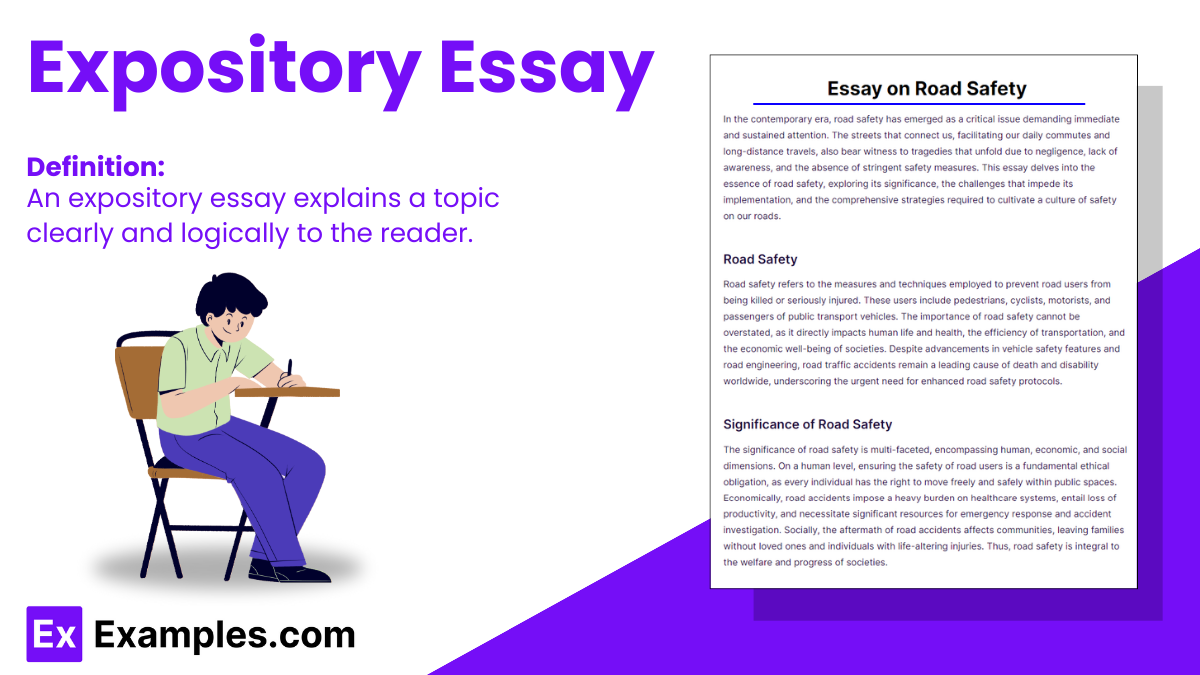
An expository essay is a quintessential part of academic writing that delves into explaining or clarifying a topic in a comprehensive manner. This type of essay requires the writer to investigate an idea, evaluate evidence, expound on the idea, and set forth an argument concerning that idea in a clear and concise manner. Discovering exemplary essay examples can greatly enhance understanding and mastery of this style. Here, we provide a complete guide with examples to empower students and educators in crafting effective expository essays
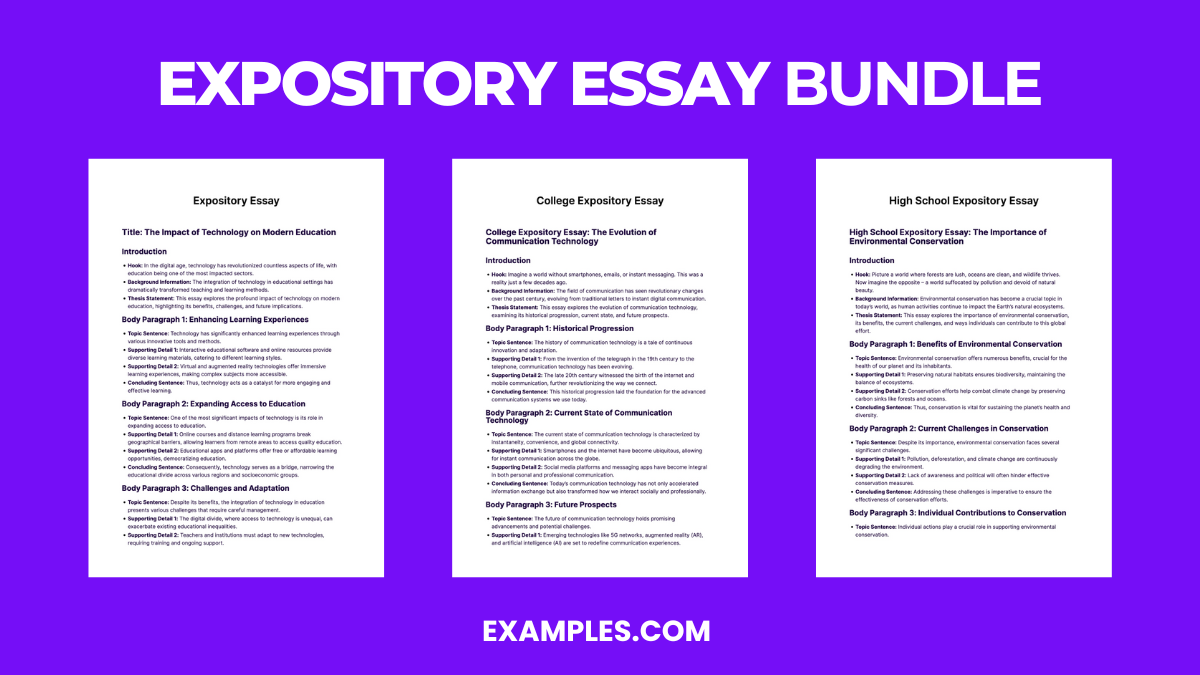
Download Expository Essay Bundle
In school, it is an unavoidable truth that you will be asked to write something about a topic which sometimes you are so eager to finish. There are also times when you feel like you do not want to write anything at all. Well, that is just normal. We all go through those times.One of the things that we do in school is essay writing . As we all know, it is never an easy job to write especially college essays . However, having the right disposition and enthusiasm makes it all so easy. By the time you start to write, all those ideas keep coming and you wouldn’t realize you’re already done.
What is an expository essay?
An expository essay is a genre of writing that investigates an idea, evaluates evidence, expounds on the idea, and sets forth an argument concerning that idea in a clear and concise manner. This type of essay requires the writer to define a topic, use examples, statistics, and facts to explain it to the reader. Expository essays are factual and devoid of the writer’s opinions, focusing instead on delivering straightforward information and analysis on a subject. Their primary purpose is to educate or explain, providing a comprehensive understanding of the topic to the reader.
Structure of an Expository Essay
It typically consists of five paragraphs, but the length can vary depending on the depth of the topic. Here’s a breakdown of the traditional structure:
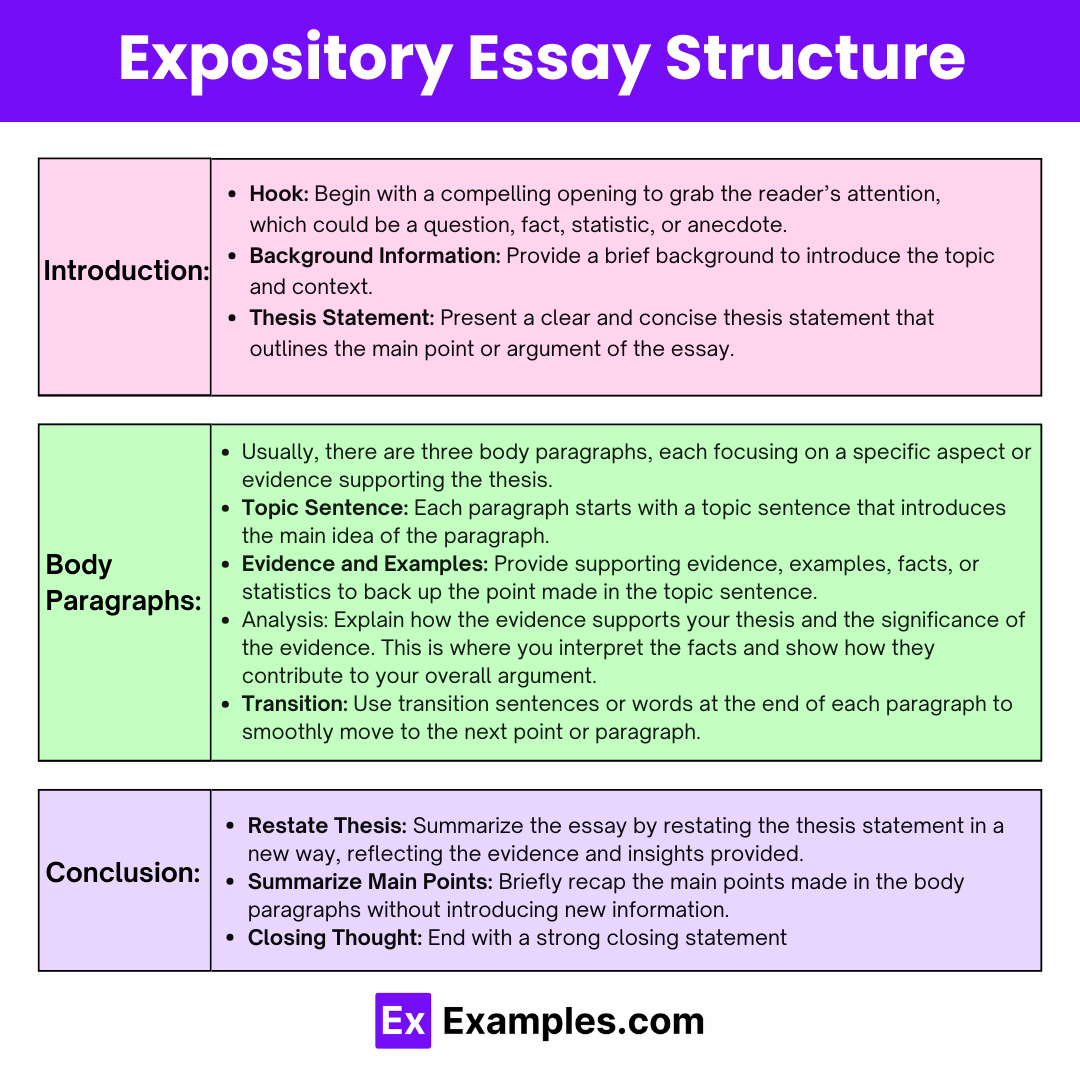
Download This Image
Introduction:
Hook: Begin with a compelling opening to grab the reader’s attention, which could be a question, fact, statistic, or anecdote. Background Information: Provide a brief background to introduce the topic and context. Thesis Statement: Present a clear and concise thesis statement that outlines the main point or argument of the essay.
Body Paragraphs:
Usually, there are three body paragraphs, each focusing on a specific aspect or evidence supporting the thesis. Topic Sentence: Each paragraph starts with a topic sentence that introduces the main idea of the paragraph. Evidence and Examples: Provide supporting evidence, examples, facts, or statistics to back up the point made in the topic sentence. Analysis: Explain how the evidence supports your thesis and the significance of the evidence. This is where you interpret the facts and show how they contribute to your overall argument. Transition: Use transition sentences or words at the end of each paragraph to smoothly move to the next point or paragraph.
Conclusion:
Restate Thesis: Summarize the essay by restating the thesis statement in a new way, reflecting the evidence and insights provided. Summarize Main Points: Briefly recap the main points made in the body paragraphs without introducing new information. Closing Thought: End with a strong closing statement that reinforces the importance of the topic or provides a call to action or thought-provoking statement to leave a lasting impression on the reader.
The primary purpose of expository writing is to explain, inform, or describe. It aims to present a balanced and objective explanation of a topic, process, or concept, based on facts without the writer’s personal opinions influencing the content.
- Educate Readers: It provides readers with a thorough understanding of a subject through clear, concise, and informative content.
- Clarify Complex Ideas: By breaking down complicated subjects into more manageable parts, it helps readers grasp difficult concepts or processes.
- Enhance Critical Thinking: Encourages readers to think critically about the subject matter as they process the information presented.
- Improve Research Skills: Involves researching and presenting facts, which cultivates research and analytical skills in both the writer and the reader.
- Present Objective Analysis: Offers an unbiased perspective, allowing readers to form their own opinions based on the presented facts.
How Do You Write an Expository Essay
Writing an expository essay involves a clear, focused approach that communicates information to the reader in a concise and effective manner. Follow these steps to write a compelling expository essay:
Choose a Topic: Select a topic that is interesting, manageable, and relevant to your assignment’s requirements. It should be broad enough to write about but narrow enough to cover comprehensively in your essay. Conduct Research: Gather information from credible sources to thoroughly understand your topic. Note down important facts, statistics, and examples that will help you explain your topic clearly. Create a Thesis Statement: Develop a clear thesis statement that outlines the main point or argument of your essay. This statement will guide the direction of your essay and inform the reader about your focus. Outline Your Essay: Organize your thoughts and research into an outline. Structure your essay into an introduction, body paragraphs, and a conclusion. This will help you maintain a logical flow when writing. Write the First Draft: Using your outline as a guide, write the first draft of your essay. Focus on getting your ideas down; you can refine and edit your work in subsequent drafts. Revise and Edit: Review your essay for clarity and coherence. Ensure each paragraph effectively supports your thesis and that your argument flows logically.Check for grammatical errors, punctuation, and spelling. Ensure that your language is clear, concise, and free of jargon. Cite Your Sources: Properly cite all the sources you used to gather information. This will add credibility to your essay and prevent plagiarism. Finalize Your Essay: Make any necessary revisions based on your review and feedback from others, if available.Ensure your essay meets the assignment criteria and is polished and professional.
Expository Essay Samples
- Essay on Internet
- Essay on Cyber Crime
- Essay on Road Safety
- Essay on National Disaster
- Essay on Floods
- Essay on Education Rules
- Essay on Politics
- Essay on World War 1
- Essay on Cold war
- Essay on Artificial Intelligence (AI)
Expository Essay Examples
[/ns_col] free download [/ns_row] college expository essay.
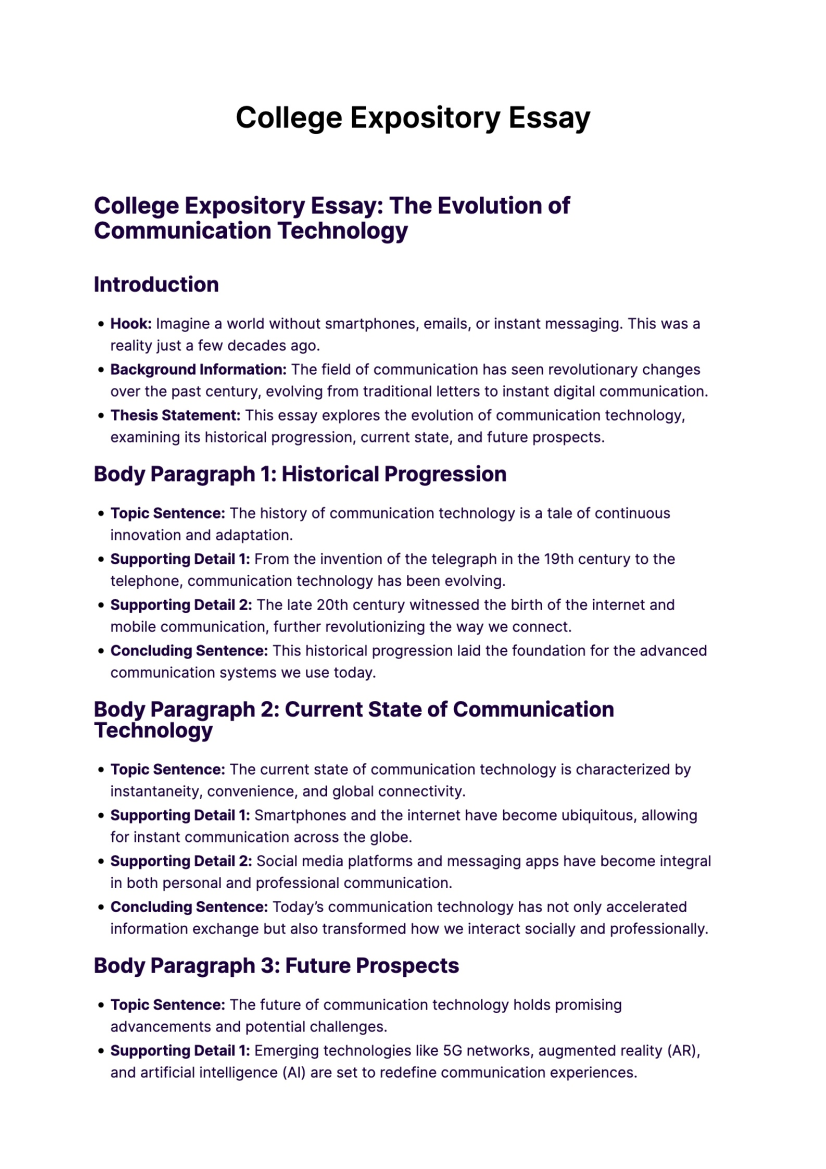
Free Download
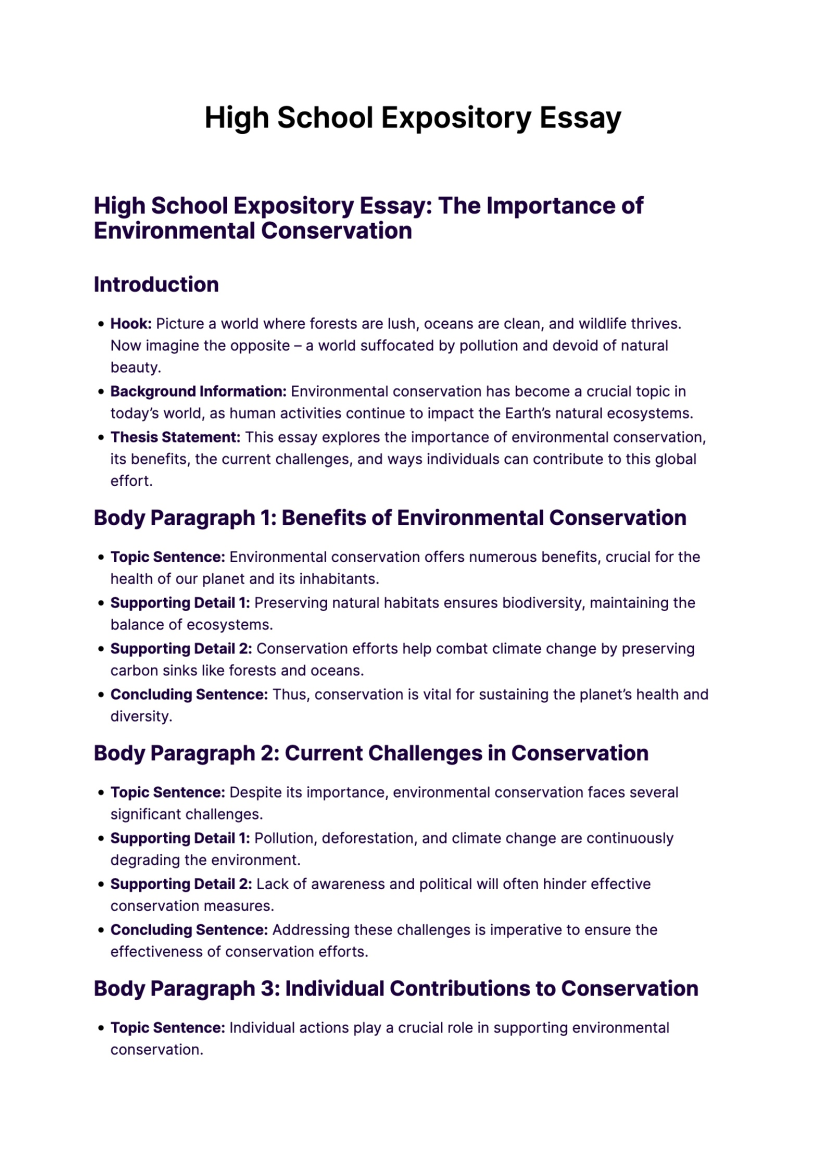
Fee Download
Essay Format

Short Expository Essay
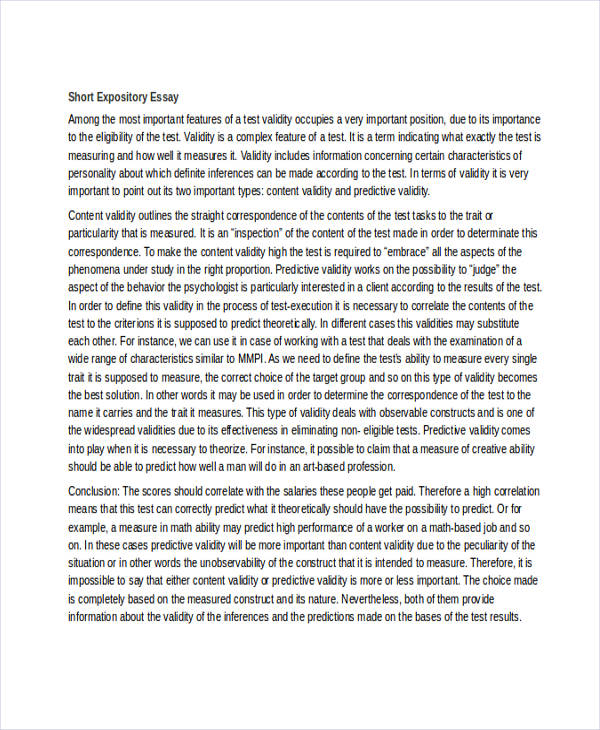
Expository Essay Sample

Expository Education
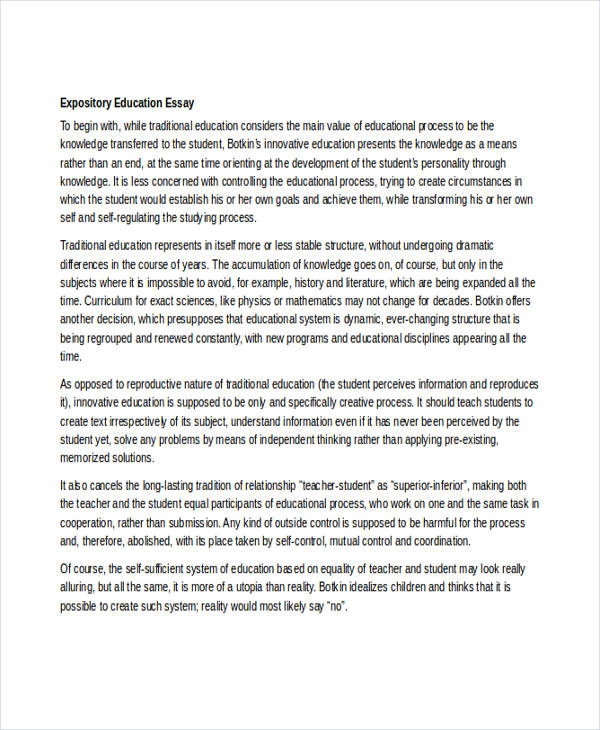
College Expository
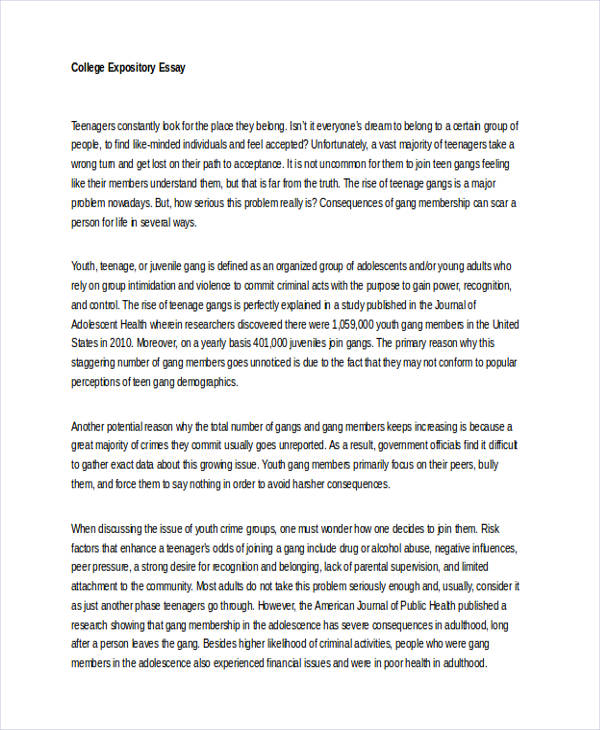
Basic Expository Essay
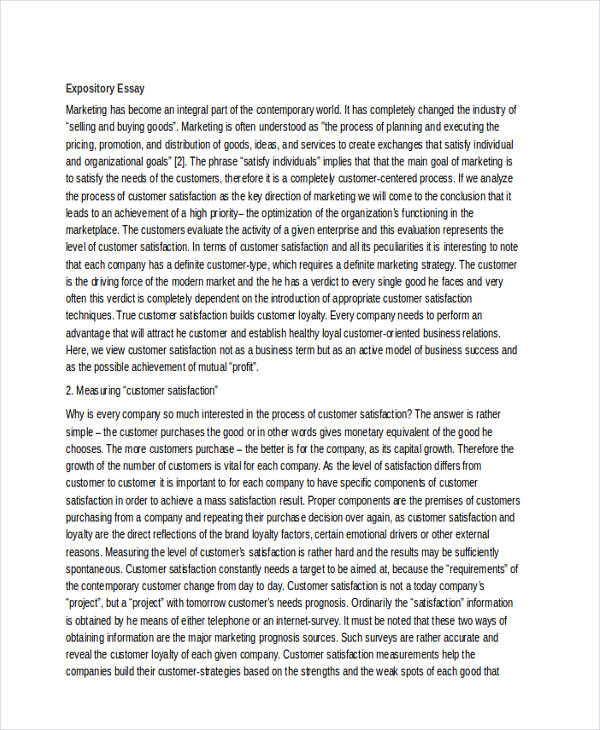
High School Expository Essay
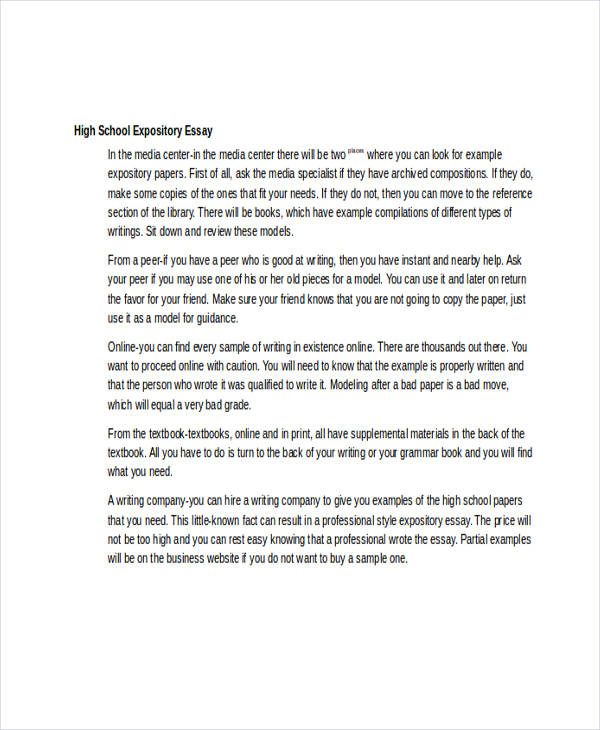
Types of Expository Essays
Expository essays are a fundamental aspect of expository writing , encompassing various forms that cater to different academic requirements and personal expressions. Each type serves a unique purpose and requires a specific approach to effectively convey information and ideas.
- Definition Essay This type of essay explores the meaning of a concept or term. It goes beyond the basic dictionary definition, providing deeper insights and personal interpretations. Ideal for exploring abstract concepts, a Definition Essay encourages critical thinking and analytical skills.
- Classification Essay In a Classification Essay, objects or ideas are sorted into categories. This form of essay is particularly useful for organizing complex information into more digestible sections, making it easier for the reader to understand and analyze the topic.
- Process Essay Also known as a “How-To” essay, the Process Essay outlines the steps required to complete a task or procedure. It is sequential and detailed, ensuring the reader can follow along and understand each stage of the process.
- Comparison and Contrast Essay This essay type examines the similarities and differences between two or more subjects. It’s a powerful tool for analysis, helping students develop critical thinking by evaluating various aspects of the subjects being compared.
- Cause and Effect Essay The Cause and Effect Essay delves into the reasons behind a specific event or situation (the cause) and its outcomes (the effect). It’s essential in academic settings for developing a student’s ability to establish logical connections and reason systematically.
- Problem and Solution Essay This essay identifies a problem and proposes one or more solutions. It not only encourages critical thinking but also fosters creativity and problem-solving skills as students explore viable solutions to real-world issues.
Each of these types of expository essays serves as a tool for students and educators to explore and convey complex ideas and information. From high school essays to more advanced academic essays, the ability to effectively write various types of expository essays is a valuable skill in educational development. Whether it’s a personal essay reflecting on individual experiences or a concept essay explaining abstract ideas, mastering these forms equips students with the capability to communicate effectively and think critically
- Tips to Write an Expository Essay
- Choose a Topic That Interests You
- Conduct Thorough Research
- Create a Detailed Outline
- Craft a Strong Thesis Statement
- Use Clear and Concise Language
- Incorporate Evidence and Examples
- Analyze the Evidence
- Follow a Logical Structure
- Write in the Third Person
- Keep Your Writing Objective
- Revise for Clarity and Cohesion
- Edit for Grammar and Spelling Mistakes
- Seek Feedback from Peers or Teachers
- Practice Writing Regularly
Guidelines to Write Expository Essay
Some people find expository writing harder than descriptive writing . Probably because it is at times difficult to present an idea and expand it so the readers can get a grasp of it. Here are a few guidelines you can use.
- Do an intensive research. Oftentimes, the problem with expository writers is that they don’t have enough points to present for the idea. Do your research.
- Widen your vocabulary. It is easier to write when you have the right words to use. You don’t have to browse your dictionary from time to time.
- Design a method. Be a little creative. There may be some methods that people use to write but it is still better if you have one for your own.
Benefits of Expository Essay
Essay writing provides a lot of benefits to students in the academe. Not only it gives them credits from their teachers, it also boosts their confidence in expressing their ideas.
Expository essays provide a better understanding of a certain topic. We cannot avoid that at times, there are things that are presented vaguely making us question what it really means. Expository essay conclusion explains it logically so we can grasp the its true meaning.
Another benefit is expository essays present a fair and balanced analysis of the idea. It eliminates writer’s opinions and emotions just like in a persuasive writing .
When Should You Write an Expository Essay?
- In Academic Assignments: Expository essays are commonly assigned in academic settings to assess students’ understanding and ability to explain complex concepts clearly.
- For Standardized Tests: Many standardized tests include expository writing sections that require candidates to organize and express their thoughts on a given topic.
- When Explaining Processes: Whenever there’s a need to describe how something works or the steps in a process, an expository essay format is ideal for providing clear instructions.
- To Clarify Concepts: Use an expository essay to break down difficult concepts or ideas into understandable parts for educational purposes or to inform a general audience.
- In Professional Settings: Professionals might write expository essays in the form of reports, manuals, or proposals to convey information or explain procedures within a company.
Text prompt
- Instructive
- Professional
Define an expository essay and its main objective
Outline the structure of a standard expository essay.
Describe the process of selecting a topic for an expository essay.
Explain the importance of research in expository essay writing.
Analyze the role of the thesis statement in expository essays
Discuss the differences between expository and narrative essays
Examine techniques for developing paragraphs in expository essays
Explain how to effectively conclude an expository essay
Describe methods for maintaining objectivity in expository writing
Analyze the impact of audience on expository essay content
- College Essay
- Argumentative Essay
Expository Essay
- Narrative Essay
- Descriptive Essay
- Scholarship Essay
- Admission Essay
- Reflective Essay
- Nursing Essay
- Economics Essay
Assignments
- Term Papers
- Research Papers
- Case Studies
- Dissertation
- Presentation
- Editing Help
- Cheap Essay Writing
- How to Order
Expository Essay Examples

Free Expository Essay Examples For Students
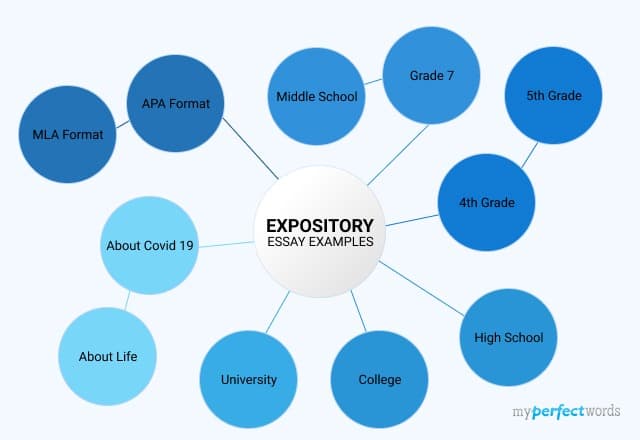
People also read
Complete Guide to Expository Essays: Writing Help and Topics
Interesting Expository Essay Topics For Your Next Paper
How to Write an Expository Essay Outline Like a Pro
Types of Expository Writing - Definition and Examples
Ultimate Guide to Writing an Expository Essay About a Person
Learn to Write an Expository Essay About Yourself
Learn the Basics of Crafting an Expository Essay about a Book
Learn to Write Expository Essay About Mental Health - Examples & Tips
How to Write an Expository Essay about Bullying: A Guide
Expository Essay About Dogs: Steps, Examples & Topics
A Guide to Writing an Expository Essay about Education
Expository Essay About Friendship: A Writing Guide
Discover How to Write Expository Essays About Music – A Step-by-Step Guide
Are you a student struggling to understand the intricacies of expository essay writing?
Do you find yourself in need of clear guidance and practical examples to master this essential skill? Look no further!
In this guide, we'll look into 10+ expository essay examples, providing you with the knowledge you need to start writing. From understanding the fundamentals to dissecting real examples, we've got you covered.
Let's get started on this journey!
- 1. What is Expository Essay Writing?
- 2. Expository Essay Examples
- 3. How to Write an Expository Essay - Example
What is Expository Essay Writing?
An expository essay is a form of academic writing that aims to inform, explain, or describe a particular topic to the reader.
The primary purpose of an expository essay is to provide a clear presentation of facts, ideas, or concepts, often without the writer's personal bias or opinion. The expository essay is a genre of essay that is similar to a descriptive essay .
There are several types of expository writing , including:
- Definition essay
- Classification essay
- Process analysis essay
- Cause and effect essay
- Problem solution essay
- Compare and contrast essay
Newspaper articles, journals, and essays that define and explain a particular topic demonstrate expository essay writing.

Not sure how to explain your topic? Let us help!
Read the examples and learn to write a good expository essay for your school or college assignment.
Expository Essay Examples
While writing an expository essay, you might face difficulties in formatting and logically connecting your information. Below we have presented some amazing examples to help you understand how to write and organize an expository essay.
Expository Essay Outline Examples
Whenever you write an expository essay, the first thing you should do is craft an outline. The expository essay outline gives shape to your essay and keeps you organized.
Here are some good expository essay outline examples that you can follow to outline your essay.
Expository Essay Outline Example
Expository Essay Outline Template Sample
Expository Essay Format Example
While writing an essay, you need to follow a proper format to present your information in a logical sequence.
The typical 5 paragraph essay consists of 1 introduction, 3 body, and 1 conclusion paragraph.
Below we have given expository essay format examples in both APA and MLA format to help you understand the formatting. Check out:
Expository Essay Examples APA Format
Expository Essay Examples MLA Format
Short Expository Essay Examples
As we have discussed above, expository essay writing requires you to describe and explain a particular subject in detail. Achieving this level of detail can be quite challenging when working with a limited word count.
To illustrate how to effectively convey information within limited words, we have provided a short expository essay example.
Short Expository Essay Example
Expository Essay Examples for Middle School
Here are some informative expository essay examples for middle school students to help you grasp the basics of expository essay writing.
Expository Essay Example For Middle School
Expository Essay Example Grade 7
Expository Essay Examples 5th Grade
Expository Essay Examples 4th Grade
Expository Essay Examples for High School
Here are some helpful expository essay examples PDFs for high school students. Check out:
Expository Essay Examples For High School
Expository Essay Examples for College
Looking for a college-level expository essay example? Check out the pdf below:
Expository Essay Examples For College
Expository Essay Examples for University
Here are some good sample expository essay pdf examples for university students.
Expository Essay Example About Life
Expository Essay Examples About Covid 19
Informative Expository Essay Example
How to Write an Expository Essay - Example
While writing an expository essay, you need to follow a proper structure. So that you can easily present your information and evidence in a logical sequence.
Here is a step-by-step process of how to write an expository essay:
Step 1. Choose an Appropriate Topic
- Brainstorm different ideas to select a compelling expository essay topic. Check out our expository essay topics blog for inspiring ideas.
- Ensure it has the potential to turn into an informative essay by being able to explain and inform effectively.
Step 2. Craft an Engaging Introduction
- Begin with a captivating hook statement to grab the reader's attention.
- Provide a brief background on the chosen topic to clarify its relevance.
- Formulate an informative thesis statement that encapsulates the core idea of your essay.
Step 3. Develop the Body Paragraphs
- Start each body paragraph with a clear topic sentence , representing the main idea of that particular paragraph.
- Support the topic sentence with credible evidence, facts, or examples that bolster your thesis statement.
- Ensure a smooth transition between paragraphs for a logical flow of ideas.
Step 4. Conclude Effectively
- Start the essay conclusion paragraph by reasserting your thesis statement.
- Summarize the key points and main arguments presented in the essay.
- Encourage the reader with a call to action, prompting them to contemplate or engage further with the topic.

Need a clear, effective essay? We can write it for you!
Step 5. Proofread and Edit
- Proofread your essay for grammatical and spelling mistakes and check if the information is presented in a proper sequence.
- Write multiple drafts and edit as needed to ensure your essay is free of errors.
In conclusion, these expository essay examples offer a valuable resource for students. They serve as effective learning tools, providing insight into the art of expository writing. By studying these examples, students can improve their writing skills, and gain a deeper understanding of essay structure.
Need assistance with expository essay writing? MyPerfectWords.com is a reputed essay writing service that provides top-notch essay help online at reasonable prices.
If you're thinking, 'Can someone do my essays for me?' – our expository essay writing service is here to help. We craft 100% original, non-plagiarized essays, even within tight deadlines.
Stop worrying and place your order now to hire the best essay writers!
Frequently Asked Questions
What are 3 examples of expository.
The three main examples of expository are;
- Scientific reports
- Magazine articles
- Academic essays
What are the 4 characteristics of expository text?
The main characteristics of expository text are;
- Informative
- Clarity
- Unbiased
- Impersonal
- Organization of the text
What is the first important step in writing an expository essay?
To write an expository essay, you must first decide how to structure your work. An expository essay generally contains an introduction, followed by three body paragraphs and a conclusion.

Write Essay Within 60 Seconds!

Caleb S. has been providing writing services for over five years and has a Masters degree from Oxford University. He is an expert in his craft and takes great pride in helping students achieve their academic goals. Caleb is a dedicated professional who always puts his clients first.
Struggling With Your Paper?
Get a custom paper written at
With a FREE Turnitin report, and a 100% money-back guarantee
LIMITED TIME ONLY!
Keep reading

OFFER EXPIRES SOON!
Expository Essay Guide
Expository Essay Examples
Last updated on: Nov 20, 2023
5+ Expository Essay Examples to Help you Get Started
By: Donna C.
Reviewed By: Jacklyn H.
Published on: Mar 22, 2023

Want to write an expository essay that will elevate your grades? Don't know what to do and what to avoid?
It can be hard to know where to start when you're writing an expository essay. Do you begin with the facts or with your own opinion? How do you structure your argument?
Let us guide you with expository essay examples!

On this Page
What is an Expository Essay?
An expository essay is a form of writing which examines and investigates a certain idea or concept in order to present evidence that supports the ideas.
It is used to evaluate the analytical skills of students in both middle school and high school.
Writing an expository essay often requires one to thoroughly research the topic, and use primary and secondary sources. Such writings are designed to explain facts, ideas, and concepts in an objective and informative manner.
This form of writing relies on presenting hard evidence in the form of statistical data, charts, graphs, and other visual presentations to support the information. By utilizing these methods of presentation, it becomes easier to explain the facts clearly.
Here is a complete guide that will help you learn more about writing an expository essay .
The expository essay examples will demonstrate how to write an expository essay without missing anything. These examples will help you in understanding the basics and once you are through them, you will be ready to write your essay in no time.
THE RISE OF TEENAGE GANGS AND ITS CONSEQUENCES
WAYS STUDENTS CAN SPEND THEIR LEISURE TIME
THE HISTORY OF CHESS
THE HISTORY OF THE AMERICAN FLAG
AN ANALYSIS OF CULTURAL DIVERSITY AND WHY DOES IT MATTER
WHY DO WE NEED EXCELLENT COMMUNICATION SKILLS
STEPHEN HAWKING - A LIFE HISTORY
WASTE MANAGEMENT FACTS AND FUTURE

Tough Essay Due? Hire Tough Writers!
You can generate even more examples specific to your topic and area of study using our AI essay generator for free!
How to Write an Expository Essay Outline?
An expository essay outline is just like any other essay and because you have been writing essays since your school years, you will have no difficulties. However, the difficult part is to know the type of information that will go into each section.
We have divided and explained the entire process that is essential to write an expository essay successfully.
The Prewriting Phase
For an effective essay, you need to plan the entire essay before writing. Many students try to do the essay without planning and end up nowhere. Instead of just getting into the paper writing process, brainstorm and think about how you can present the ideas in a structured manner.
Make points of what you will add in each section.
Preparing the First Draft
After brainstorming and noting down every main detail and theme, prepare the first draft of the essay. Add what points you will add in each section. An expository essay structure has the following sections:
- Introduction: An introduction is the first section of an essay. It is a brief mention of the main points and themes of the essay. It includes the background of the main topic and some information about it. However, everything is added briefly.
- Thesis Statement: A well-defined but brief thesis statement will elevate your essay and inform the readers about the main theme of your essay. However, the thesis statement should be brief and should not present the whole theme of the essay.
- Body Paragraphs: Generally, these are three in number and present three main ideas. These paragraphs of the essay examine, analyze and present the main ideas along with the supporting evidence. Each sentence must begin with a topic sentence and expound on the main idea of that paragraph.
- Conclusion: It is the last encounter between you and the readers and this is why it must be strong and memorable. Restate your thesis statement and the overall essence of the essay. You can do it by mentioning the main points briefly or by just presenting the answer to the main essay question.
Final Revision
Revision is the most important part of the writing process. In this phase, you can revise, modify and restructure your essay and rectify it according to the guidelines and main essay question. Some of the things to consider while revising your essay are:
- Have you answered the main question properly and completely?
- Does your essay meet all the guidelines of the instructor?
- Have you added all the main ideas in the essay?
- Is there a proper transition between the sentences and paragraphs?
- Are all the paragraphs consistent and well-structured?
Answering these questions is a must and therefore, you should never miss this part.
Proofreading
After you are done, proofread the entire essay before submitting it. It may seem daunting and dull but, just like revision, proofreading is also important. Proofread the essay thoroughly and see if everything is in line. At this stage, you can still make the changes.
We hope that these tips will act as a writing guide for you and will help you in writing an excellent expository essay.
Paper Due? Why Suffer? That's our Job!
What are the Other Types of Expository Essays?
This type of essay is further divided into the following types of expository writing. These are explained below
Descriptive Essay: This essay requires describing a place, person, or event in detail. It includes great sensory details and is written to persuade the reader to see the writer’s viewpoint.
Definition Essay: A definition essay describes a certain phrase or term in detail. The topics can be concrete or abstract in nature and include the explanation of both literal and contextual meanings of the chosen word.
Compare and Contrast: These essays explain two or more things by comparing and contrasting them. They highlight the main points and describe the chosen objects by elaborating their various elements and qualities.
Classification Essay: The writer breaks down the main essay topic and divides it into several classes and categories and explains them one by one.
Process Essay: The writer breaks down a process and explains it in detail. This could be a manufacturing process, a recipe, and even a writing process. It explains the how-to process and how to do it in detail.
Cause and Effect Essay: This essay describes the reasons behind a phenomenon or happening. It explains why something happens and what are the causes behind them. In short, a cause and effect essay explains the relationship between a certain event and its reasons.
Get Professional Writing Help!
All in all, an expository essay is a very useful tool that helps students improve their writing skills. If you're still having trouble with your essay, don't hesitate to ask for help.
But don't worry! If you are looking up “who can write my essay for me?” Well, you’re in the right place!
5StarEssays.com is an experienced and skilled essay writing service that works with students that are looking for some help. All of our professional writers have exceptional writing skills and will provide a top-quality essay within your deadline. This is what makes us the best.
Order your essay now.

Marketing, Literature
Donna has garnered the best reviews and ratings for her work. She enjoys writing about a variety of topics but is particularly interested in social issues, current events, and human interest stories. She is a sought-after voice in the industry, known for her engaging, professional writing style.
Was This Blog Helpful?
Keep reading.
- Expository Essay - A Complete Guideline to Help You Write

- Expository Essay Topics Recommended by Experts

- How to Write an Expository Essay Outline - Complementary Template Added

Say Goodbye to Academic Stress!
With FREE AI report, Turnitin report, bibliography, title page, and a lot more!
LIMITED TIME ONLY
People Also Read
- how to avoid plagiarism
- how to write a conclusion
- book review
- writing a book
- thematic statement
Burdened With Assignments?

Advertisement
OFFER EXPIRES SOON!
© 2024 - All rights reserved

IMAGES
VIDEO
COMMENTS
Get past the thesis statement with two examples of expository essays. Learn more about the format, requirements, and types of expository writing for middle and high school.
Unlike argumentative or persuasive essays, expository essays do not aim to convince the reader of a particular point of view. Instead, they focus on providing a balanced and thorough explanation of a subject. Key characteristics of an expository essay include: Clarity and Conciseness; Structured Organization (Introduction, Body, Conclusion)
An expository essay is a common assignment in high-school and university composition classes. It might be assigned as coursework, in class, or as part of an exam. Sometimes you might not be told explicitly to write an expository essay. Look out for prompts containing keywords like “explain” and “define.”
Expository essays are factual and devoid of the writer’s opinions, focusing instead on delivering straightforward information and analysis on a subject. Their primary purpose is to educate or explain, providing a comprehensive understanding of the topic to the reader.
Expository Essay Examples for High School. Here are some helpful expository essay examples PDFs for high school students. Check out:
Writing an expository essay often requires one to thoroughly research the topic, and use primary and secondary sources. Such writings are designed to explain facts, ideas, and concepts in an objective and informative manner.